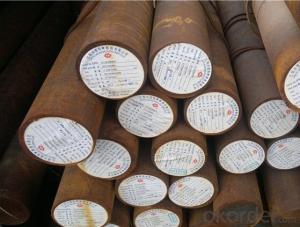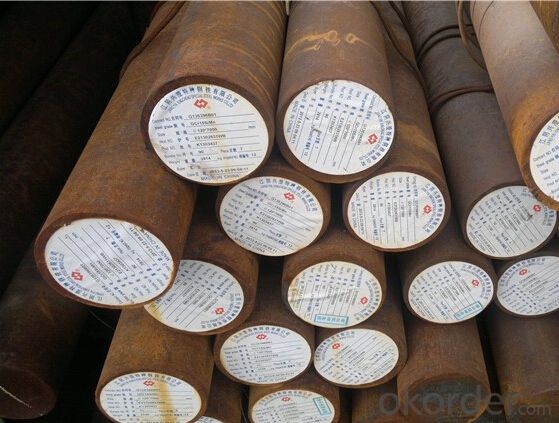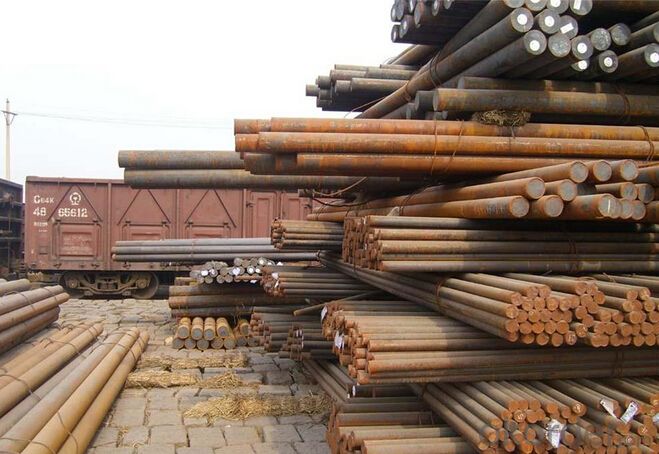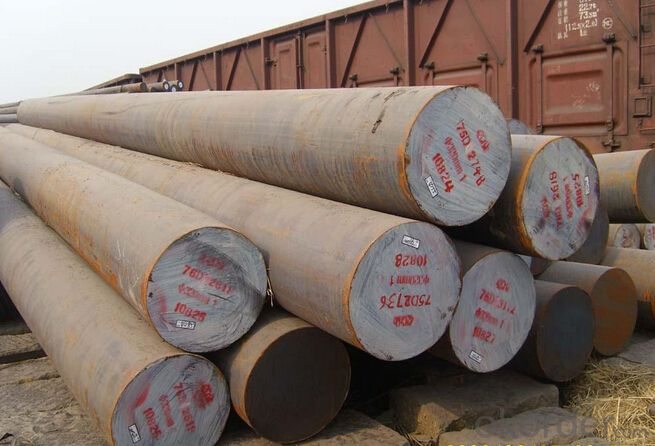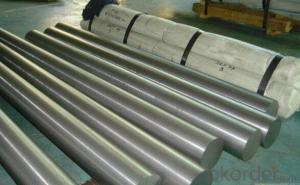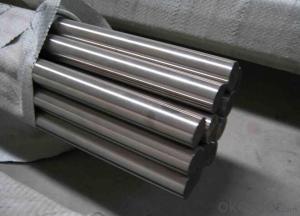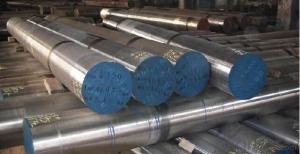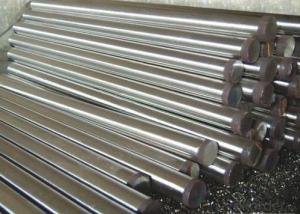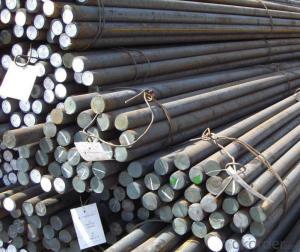Alloy Round Bar 51CrV4/6150/SUP10/50CrVA
- Loading Port:
- China main port
- Payment Terms:
- TT OR LC
- Min Order Qty:
- 30 m.t.
- Supply Capability:
- 10000 m.t./month
OKorder Service Pledge
OKorder Financial Service
You Might Also Like
Specification
Alloy Round Bar 51CrV4/6150/SUP10/50CrVA
Product Information:
Technique:Forged/Hot rolled/Cold draw/ESR/Grind-ed
Special use:Mold steel
Standard:AISI/ASTM/BS/DIN/GB/JIS
Surface:Black/Sanded/Turned/Peeled/Milled
Application:For military or aviation use
Dimensions:(Alloy round bars)Diameter12-350mm
Dimensions:(Square billets)H=100-400mm,B=100-550mm
Alloy or not:Is alloy
Certification:ISO9001
Quality inspection:UT,Chemical composition,Physical properties
Product Overviews:
| Product Name | Typical Grades | Diameter(mm) | Standard adopted |
| Carbon Steel | 20 (1020/S20C/C22) | Ø16-Ø300 | GB/SAE/JIS/DIN |
| 40 (1040/S40C/C40) | |||
| 45 (1045/S45C/C45) | |||
| Bearing Steel | GCr9 (51100/SUJ1) | Ø12-Ø250 | |
| GCr15 (52100/SUJ2/100Gr6) | |||
| GCr9SiMn (A485-Gr.1/SUJ3) | |||
| Cr-Mo Steel | 20Cr (5120/SCr420H/20Cr4) | Ø12-Ø250 | |
| 40Cr (5140/SCr440/41Cr4) | |||
| 42CrMo(4140/SCM440/42CrMo4) | |||
| Gear Steel | 20CrNiMo | Ø16-Ø600 | |
| 20CrMn(5115/SMnC420/20MnCr5) | |||
| 20CrNiMo(8620/SNCM220/20CrMiMo2) |
Product Show:

Our Advantages:
· Industry experience over 20 years.
· Shipment of goods -More than 70 countries worldwide.
· The most convenient transport and prompt delivery.
· Competitive price with best service.
· High technical production line with top quality products.
· High reputation based on best quality products.
With our experienced, enthusiastic and dynamic staffs, we assure to bring you the products with best quality, reasonable prices and good after-sales services under the motto: Friends First, Business After.
Communication, Experience, Expertise and Best efforts are our Promises to you.
- Q: What are the different oil and gas grades of special steel?
- There are several different oil and gas grades of special steel, including but not limited to API 5CT, API 5L, and ASTM A106. These grades are specifically designed to meet the requirements and demands of the oil and gas industry, ensuring high strength, corrosion resistance, and durability in harsh environments.
- Q: How does special steel perform in abrasive wear conditions?
- Special steel is specifically designed to perform exceptionally well in abrasive wear conditions. Its unique composition and manufacturing process make it highly resistant to the detrimental effects of abrasion. The presence of alloying elements such as chromium, manganese, and molybdenum in special steel significantly enhances its hardness and toughness. These elements help to form carbides within the steel matrix, which act as barriers against abrasion. The carbides effectively resist the forces exerted by abrasive particles, preventing them from causing significant damage to the steel surface. Furthermore, special steel undergoes specialized heat treatment processes such as quenching and tempering, which further enhance its resistance to abrasive wear. These processes not only increase the hardness of the steel but also improve its overall toughness and durability. As a result, special steel is capable of withstanding high levels of abrasion without experiencing significant wear or deterioration. In addition to its exceptional mechanical properties, special steel also exhibits excellent corrosion resistance. This is achieved through the addition of elements such as chromium, which forms a protective oxide layer on the steel surface. This oxide layer acts as a barrier, preventing corrosive substances from reaching the underlying steel and causing further damage. Overall, special steel performs exceptionally well in abrasive wear conditions. Its unique composition, heat treatment processes, and corrosion resistance properties make it an ideal material for applications where abrasion is a major concern. Whether in mining, manufacturing, or other industries where abrasive wear is prevalent, special steel can provide superior performance and extended lifespan, ensuring optimal efficiency and cost-effectiveness.
- Q: How does special steel perform in terms of impact resistance?
- Special steel typically performs very well in terms of impact resistance. Due to its unique composition and manufacturing process, it is able to withstand high amounts of force and pressure without fracturing or breaking. This makes it highly suitable for applications where impact or shock loads are common, such as in construction, automotive, and aerospace industries.
- Q: What are the specific requirements for special steel used in the textile industry?
- The specific requirements for special steel used in the textile industry are primarily related to its durability, corrosion resistance, and heat resistance. Due to the harsh conditions and high temperatures involved in textile processing, the steel used must be able to withstand these conditions without compromising its structural integrity. Firstly, the steel used in the textile industry must possess excellent durability. It should be able to withstand high mechanical stress, including tension, compression, and bending, without experiencing deformation or breakage. This is important as the machinery in the textile industry undergoes constant movement and repetitive actions. Corrosion resistance is another crucial requirement for special steel in the textile industry. The steel should be resistant to corrosion caused by chemicals, moisture, and other environmental factors. This is especially important as textile manufacturing processes often involve the use of various chemicals and water. Heat resistance is also vital for special steel in the textile industry. As the manufacturing processes involve high temperatures, the steel used must be able to withstand and maintain its strength and properties under these conditions. This ensures the longevity and efficiency of the equipment and machinery used in textile production. Additionally, the steel used in the textile industry should have excellent machinability. It should be easy to cut, shape, and form into various components and parts required for textile machinery. This allows for efficient manufacturing and customization of equipment as per specific needs. Furthermore, the steel may also need to meet specific standards and certifications set by regulatory bodies or industry organizations, ensuring that it meets the necessary quality and safety requirements. For instance, it may need to comply with international standards such as ISO 9001 for quality management systems. In summary, the specific requirements for special steel used in the textile industry include durability, corrosion resistance, heat resistance, machinability, and compliance with relevant standards. Meeting these requirements ensures that the steel can withstand the demanding conditions of textile manufacturing and contribute to the efficiency and reliability of the machinery involved.
- Q: What are the factors to consider when selecting special steel for a specific application?
- When selecting special steel for a specific application, there are several important factors to consider: 1. Mechanical properties: The mechanical properties of the steel, such as strength, hardness, toughness, and ductility, are crucial in determining its suitability for a particular application. It is important to match the steel's mechanical properties to the specific requirements of the application to ensure optimal performance and safety. 2. Corrosion resistance: Depending on the application, it is essential to consider the steel's resistance to corrosion. Different environments, such as marine, chemical, or high-temperature conditions, may require specific corrosion-resistant alloys or coatings to ensure the longevity and reliability of the steel in service. 3. Temperature resistance: The ability of the steel to withstand high or low temperatures without losing its mechanical properties is crucial in many applications. Factors such as thermal expansion, thermal conductivity, and resistance to thermal fatigue must be considered to ensure the steel can perform effectively in the intended environment. 4. Weldability and fabricability: If the steel needs to be welded or fabricated into complex shapes, the ease of weldability and fabricability becomes an important factor. Some steels may require specialized welding techniques or preheating to avoid cracking or distortion during fabrication. 5. Cost: Cost is also a key consideration when selecting special steel for a specific application. It is important to balance the desired properties of the steel with the available budget to ensure cost-effectiveness without compromising performance or safety. 6. Availability: The availability of the chosen steel grade in the required form, size, and quantity is another critical factor. It is important to ensure that the selected steel can be easily sourced and obtained within the required timeframe to avoid project delays or cost overruns. 7. Compliance with standards and specifications: Depending on the industry or application, there may be specific standards, specifications, or regulations that the steel must comply with. It is essential to select a steel grade that meets these requirements to ensure compliance and maintain the necessary certifications or approvals. By considering these factors, engineers and manufacturers can make an informed decision when selecting special steel for a specific application, ensuring optimal performance, durability, and safety.
- Q: What are the factors that affect the weldability of special steel?
- The factors that affect the weldability of special steel include the composition of the steel, including the presence of elements such as carbon, alloying elements, and impurities; the heat treatment history of the steel; the thickness and shape of the steel; the welding process and parameters used; and the skill and experience of the welder.
- Q: Can special steel be used in the automotive industry?
- Yes, special steel can be used in the automotive industry. It is often utilized in various components and parts of vehicles due to its high strength, durability, and resistance to wear and corrosion. Special steel alloys can enhance the performance, safety, and efficiency of automobiles, making it a suitable choice for the automotive industry.
- Q: Can special steel be used for making renewable energy equipment?
- Yes, special steel can be used for making renewable energy equipment. Special steel alloys are often used in the manufacturing of components such as wind turbine towers, solar panel frames, and hydroelectric power plant structures. These alloys possess high strength, durability, corrosion resistance, and other properties necessary for withstanding the harsh environmental conditions and demands of renewable energy systems.
- Q: How is magnetic alloy steel used in the production of magnetic components?
- Magnetic alloy steel is used in the production of magnetic components due to its high magnetic permeability and excellent magnetic properties. It is commonly utilized in manufacturing various magnetic components such as cores, stators, rotors, and transformers. The alloy's magnetic properties allow for efficient magnetization and demagnetization, making it suitable for applications where strong magnetic fields are required. Additionally, magnetic alloy steel is often used in electrical motors, generators, and magnetic sensors, contributing to their overall performance and reliability.
- Q: Can special steel be used in the medical field?
- Yes, the medical field utilizes special steel. Special steel alloys, including but not limited to stainless steel, find extensive application in medical and surgical instruments, implants, and equipment. Stainless steel is selected for its remarkable resistance to corrosion, exceptional strength, and enduring durability. It is commonly employed in surgical instruments like scalpels, forceps, and needles, as well as in orthopedic implants like bone screws and plates. Moreover, special steel alloys are employed in the fabrication of medical equipment such as MRI machines and X-ray tables, where high strength and magnetic properties are imperative. In summary, special steel plays a pivotal role in the medical field owing to its distinctive characteristics and capacity to meet stringent criteria for hygiene, safety, and dependability.
Send your message to us
Alloy Round Bar 51CrV4/6150/SUP10/50CrVA
- Loading Port:
- China main port
- Payment Terms:
- TT OR LC
- Min Order Qty:
- 30 m.t.
- Supply Capability:
- 10000 m.t./month
OKorder Service Pledge
OKorder Financial Service
Similar products
Hot products
Hot Searches
Related keywords
